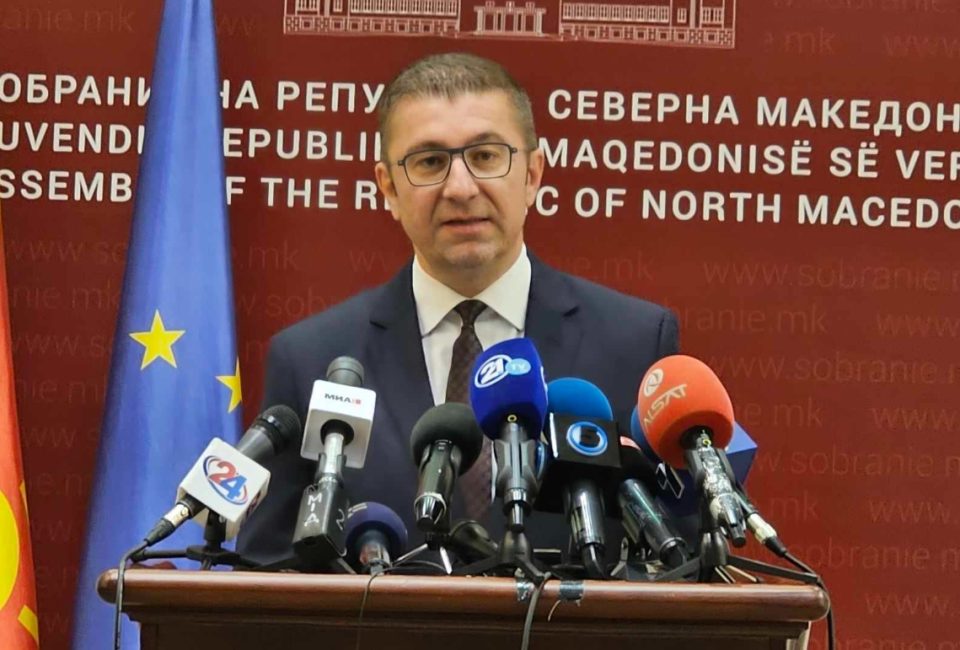In an extensive interview, Prim Minister Hristijan Mickoski discussed his accomplishments in the first 80 days, while also covering issues such as the name dispute with Greece, attempts from the DUI party to stir ethnic trouble and the dismal state of the rule of law.
In this period we adopted the law on the Government, reorganizing the Government, making it more efficient, which is a good step for future generations. We rebalanced the budget to include many items that were left out, including more than 80 million EUR that were lacking. We provided a billion denars owed to our farmers that were not included in the budget, as well as a billion denars for vacation bonuses for the public sector administration. 6 billion denars are set aside for infrastructure investments in our municipalities, and today we have 250 proposals from 66 municipalities. My coalition runs 44 municipalities, so these are not just VMRO led municipalities – despite claims that this project will not be successful. We secured a huge foreign investment of half a billion EUR that will generate about 25-30 percent of our total production, which is a major step toward our energy independence and sovereignty, as well as three additional major investments, and we are working on three new ones, Mickoski said.
Regarding the name issue with Greece, where Mickoski refuses to use the imposed name “North Macedonia” in public events while it remains in use in official situations, the Prime Minister said that he never promised to “bring back the name”. He criticized the imposed treaty as “bad and harmful – I’ve said it before and I’ll say it again”.
I tell this to my Greek colleagues, to everyone. The replies are that this is an agreement that resolved a decades old problem, and opened the doors for Macedonia’s membership to NATO and so on. That is it, political arguments, without essence.. I apologize that I did not bring back the name in the past 80 days. I did not promise to bring it back, Mickoski said, adding that such a process would require majority from the ethnic Albanians as well.
The Prime Minister dismissed a viewer comment that Macedonia can hold a referendum to scrap another highly unpopular agremeent – the Zaev – Borisov treaty from 2017, which Bulgaria now uses to condition Macedonia’s path toward the European Union. Mickoski said that such a gambit could fail and the referendum could be unsuccessful, just as the 2018 referendum on the name issue treaty with Greece. In that case, the treaty would be reinforced. “In that case should we accept everything that is part of that treaty? We have to enter a process where we will clearly know its outcome”, Mickoski told journalist Kristijan Landov.
According to Mickoski, Macedonia continues to face attemtps from the DUI party to stir ethnic tensions. “We see attempts from DUI not to compete with the Albanian opposition, but to compete with VMRO-DPMNE, in light of the feckless state in SDSM, as opposition party. VLEN remains far and away a better political option than DUI is and I urge VLEN to compete with DUI on issues that improve living standards of the ethnic Albanian citizens, Mickoski said, calling on his Albanian coalition partner to avoid falling into the trap of nationalist policies that DUI wants to ensnare them in.
A possible initial step in the attempts to stir ethnic trouble was made earlier this week when a group of ethnic Macedonian protesters were detained in the village of Vrapciste near Gostivar, where they wanted to work on a rural church that is being built without a permit. After the municipal authorities in this largely Albanian area, who are allied with DUI, refused to allow the construction to continue, Macedonian protesters gathered in the municipal office, and were eventually removed by the police. The images of Macedonians being arrested, in a part of the country known for rampant construction without permits, caused outrage. Mickoski warned that the protesters have a deep political background, alluding to their ties with the opposition SDSM party, which VMRO has accused of trying to help DUI in its plans to stir ethnic conflict, while the local police commissioner, Mickoski said, is close to DUI. “The bishop of Polog condemned the situation, and recused himself from the incident, as did the local citizens. So, it’s clear what the intent was. Our citizens should feel secure, but such isolated incidents will happen in the future as well”, Mickoski said.
The Prime Minister expressed full support for the remaining political prisoners from the persecution campaign of the Zaev regime, including those sentenced for the April 27th incident. Some of them were given temporary medical leave from serving their lengthy prison sentences, but no sentences have been quashed yet. Mickoski said that these prisoners acknowledge that they did something wrong, but not to the extent of the sentences, that included allegations of terrorist endangerment of the constitutional order. Instead of pardons, generally the prisoners want retrials that would prove their innocence of the excessive charges. “I have helped them in the past and my conscience toward them is clear”, Mickoski said.
The Prime Minister announced broader changes to the collapsing judicial system, including options to have prosecutors criminally liable for their actions. After his initial proposal, to change the way judges and prosecutors are appointed, was cricitized by international representatives, Mickoski said that the Government is in talks to work with a distinguished Croatian expert who would make proposals that will meet Macedonia’s dire needs while respecting European standards.





Comments are closed for this post.